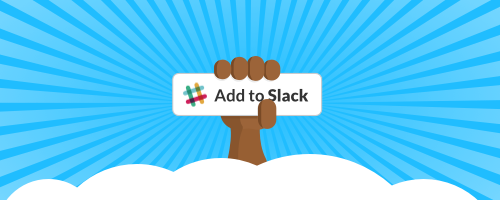I am 100% in favor of “flesh tones” reflecting a broader range than the usual “pasty white.”
On August 25th, Slack unveiled a new way for developers to connect to Slack, the “Add to Slack” button. It was the culmination of a great deal of work from many Slack employees, and just the beginning of what we have in store for Slack in the near future. Today, though, I want to talk about a seemingly small detail that has been more important to me than I would have expected: the skin color of the hand in the launch graphics.

I’m also 100% in favor of writing up the thinking behind these kinds of choices.
Diógenes, Brown Person: This hand should totally be brown. I’m brown.
Diogenes, Person: I’m trying to get good design work done and get this project out, not become an activist and start a movement or something.
Diógenes, Brown Person: It’s not a big deal, you’re the designer, you get to make it brown.
Diogenes, Person: Yea but, I’m going to ask Matt to do it, that’s like, making a thing of it.
More of us should make a thing of it. Especially us pasty folk.